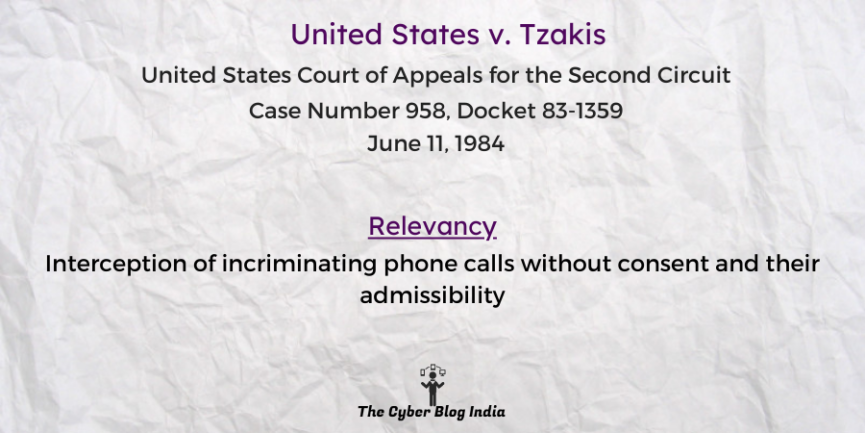United States of America v. Tzakis

United States v. Tzakis
736 F.2d 867
In the United States Court of Appeals for the Second Circuit
Case Number 958, Docket 83-1359
Before Circuit Judge Lumbard, Circuit Judge Newman, and Circuit Judge Pratt
Decided on June 11, 1984
Relevancy of the case: Interception of incriminating phone calls without consent and their admissibility
Statutes and Provisions Involved
- The Conspiracy Statute, 18 U.S.C. § 371
- The Wire Fraud Statute, 18 U.S.C. § 1343
- The National Stolen Property Act, 18 U.S.C. § 2314
- The Wiretap Act, 18 U.S.C. § 2511 (2)(d)
Relevant Facts of the Case
- The defendant posed as an international financier, promising businessmen low-interest loans but failing to provide them.
- Hunter made two long-distance phone calls to Tzakis while incarcerated at the Metropolitan Correction Centre in Manhattan.
- Guccione, a fellow inmate, facilitated the calls by setting up three-way conference calls between the defendant and his wife, informing him that his wife would remain on the call, and the defendant agreed. The defendant was unaware that the FBI had obtained the call recordings.
- During the pre-trial stage, the prosecution charged the defendants and sought the denial of their suppression motions.
- After a two-week trial, Tzakis was sentenced to five years’ probation and served consecutively with his prison sentences. The judge ordered Tzakis to pay $400,000 in restitution to the five victim groups as a special condition of probation.
Prominent Arguments by the Counsels
- The defendant’s counsel argued that the tapes should have been suppressed because they violated Section 2511(2)(d). Additionally, they contended that the defendant only agreed to the mechanical interception of the call to ensure the connection.
Opinion of the Bench
- Hunter was aware Mrs Guccione would occasionally monitor his calls by listening in and had agreed to her participation. When she joined the conversations, Hunter did not object.
- It could not be connoted to mechanical interpretation and upheld the district court’s findings.
Final Decision
- The court upheld the defendant’s conviction.
Sreekutty R, an undergraduate student at National Law University Odisha, prepared this case summary during her internship with The Cyber Blog India in May/June 2023.
